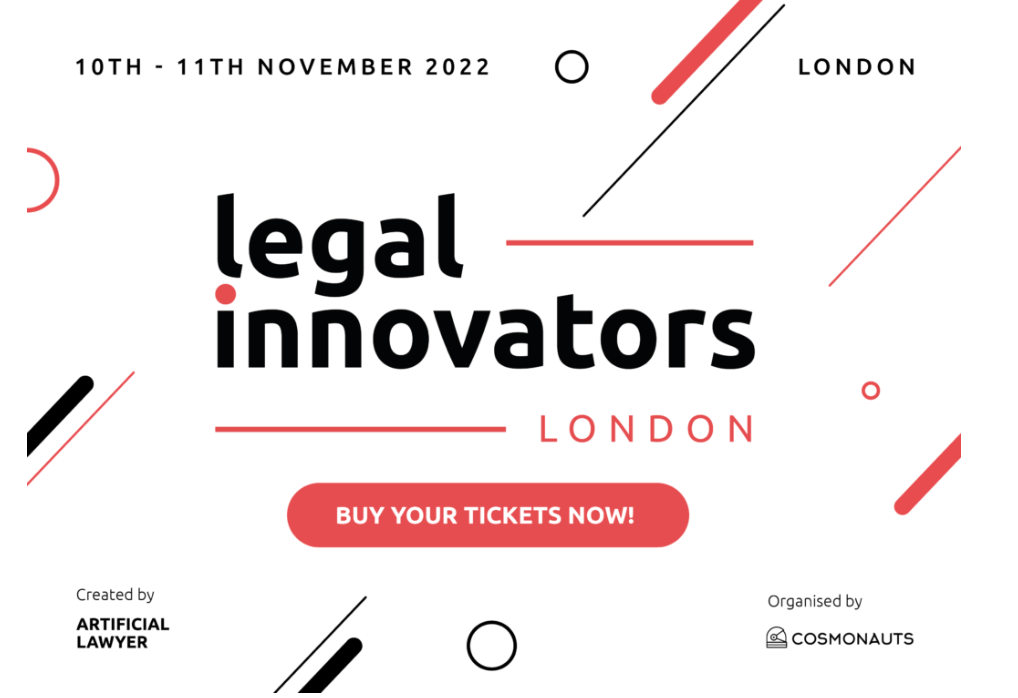
This week’s Legal Innovator Profile is with Jezah Khamisa, Knowledge & Innovation Manager at leading law firm Slaughter and May.
When did you first hear the term ‘legal tech’ and what did you think at the time?
I think I first heard the term when I was a trainee in what was then the Dispute Resolution group at Slaughter and May and I was in charge of managing the logistics for a hearing taking place in Singapore. I was in regular contact with the legal technology specialists, Opus 2 – who focus on technology for legal proceedings – to arrange various parts of the hearing, such as the electronic presentation of evidence, transcription services and general case management and technical support.
Through my dealings with Opus 2, I was loosely aware that legal tech encompassed the technology used by lawyers to make delivering their work more efficient, however, I thought of it entirely in the disputes context; I had no idea of the breadth and variety of tools and providers in the industry. In fact, at the time, I’m not sure I even appreciated it was an industry in its own right! The only other technology exposure I’d had in a specifically legal context was to e-Disclosure platforms, which I primarily used for document review exercises. I had a very rudimentary understanding of how those platforms worked and wasn’t aware at the time that similar platforms existed for other practice areas.
What is your role now?
I’m currently a Knowledge and Innovation Manager at Slaughter and May – I moved into this role in October 2021, two years after qualifying into the firm’s Disputes and Investigations group. I’m part of a really fantastic (and growing!) team made up of a range of ex-lawyers, knowledge management professionals and general innovation enthusiasts.
Our team focuses on developing and generally promulgating innovative ways of delivering legal services, whether that’s through the use of new legal technology or the implementation of process improvements. In addition to running legal tech pilots, we also spend a lot of time upskilling lawyers in the firm on our various legal tech tools and running interactive workshops – such as legal process design workshops – with our clients to drill down into the key pain points and devise appropriate solutions. The role is really varied and requires talking to and working with a variety of people, both within and outside of the firm, which is great!
Why did you move into this field, (if this is not the only field you’ve worked in)?
Like many others in this field, I practised as a lawyer prior to my current role. I think I realised that the parts of ‘lawyering’ that excited and interested me the most were thinking about how best to present our advice to the client in a ‘user friendly’ manner and how to plan and carry out our legal work in the most efficient way; I loved thinking about new ways of doing things and felt (and still feel!) passionately about not accepting things just as they are. I knew I enjoyed problem solving and I also wanted more opportunities to utilise creativity and test new ideas in my day-to-day work.
Being honest with myself about what it is that I actually enjoy and find interesting in a job really gave me the confidence to make the move and I’m thrilled to have been able to do that at the same firm at which I trained and qualified.
What is the most rewarding aspect of your job?
Seeing and speaking to lawyers for whom either technology or a new process has made a real difference to their job is incredibly rewarding. Lawyers get a bad reputation for being change and risk-averse, but I think the issues are a lot more nuanced; many lawyers want to embrace new ways of working, but don’t always have the framework in which to achieve it, nor the time. So, when the opportunity presents itself and the results are positive, I find it really excites and motivates me to consider how and where else the solution could be replicated.
I also really enjoy the legal tech pilot process, in particular, the stages of working with the lawyers and the tech provider to really understand both what works well and doesn’t work so well from a user experience perspective and to create appropriate solutions to remedy any issues. Arriving at a solution together, as a team, is a really rewarding experience.
If you looked into a crystal ball, how much do you think the everyday practice of law will change in the next five to ten years?
I think we’ll continue to see the already burgeoning legal operations function become ubiquitous across the legal industry, whether that’s within law firms or in client organisations. In the last five years in particular, we’ve seen a marked increase in legal operations professionals who don’t necessarily have a legal background, but are nevertheless a key part of the core functioning of a legal business. As a result, I think we’ll see a blurring of the line between lawyers and non-lawyers and a more collaborative approach taken to delivering legal services.
If you had one gripe about legal tech companies what would it be?
Legal tech companies have a tough job and I really empathise having been on the service provider side not too long ago. If I had to pick one thing, it would be their websites. A lot of time and effort clearly goes into making company websites visually appealing – and for the most part, they all look great – but I often find it very difficult to decipher what the company actually does! In the tech industry in general, many of us fall into the trap of using jargon, buzzwords and broad-brush statements which often obscure simple, but key points. I think companies could be bolder and clearer about their product’s many great features whilst making sure they have a lay reader in mind.
If you had one thing you’d really like to applaud legal tech companies for, what would it be?
Their monumental efforts to accommodate what are often bespoke requirements. I am consistently impressed by (and incredibly grateful for) the sheer amount of time and effort dedicated to making sure their products meet our many requirements, whether that’s through general product development or tailor-made solutions. With that comes a commendable amount of patience and flexibility, but also a real desire to understand how our business works.
And finally, what advice would you give to anyone wanting to get into this field?
My main piece of advice is: regardless of your current role, start questioning things and be curious. A key part of the job is being unafraid to advocate for your new ideas, to disagree with others and to trial new solutions; when it comes to interviews, it’s great if you’re able to demonstrate areas where you have already done some or all of these things.
I’d also say start talking to and connecting with people in the industry; I’ve found everyone to be incredibly friendly and willing to share experiences and insight. For anyone who already works at a law firm, I’d really encourage you to talk to members of your knowledge / innovation / legal tech team(s) as you will likely find a plethora of people who understand the context in which you’re working and feel just as passionately as you about driving change. I also learnt a huge amount from legal tech newsletters (like this one!) and podcasts as they’re a great way to understand the salient issues, key trends and emerging technologies.
Finally: be patient and understand that change is incremental. It won’t always be easy to measure your value or impact, so it’s important to remember the bigger picture and not give up!
Thanks Jezah!
—
Legal Innovators UK Conference – London, November 10 + 11
If you found the topics covered in this profile of interest then come along to the landmark two-day legal innovation conference in London. Day One: Law Firms and ALSPs, Day Two: Inhouse and Legal Ops. We have a fantastic line-up of speakers from across the legal and legal tech ecosystems for this event focused on learning, sharing and networking. See you there!
Tickets and more information can be found here.
